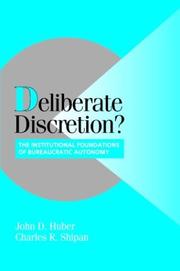| Listing 1 - 2 of 2 |
Sort by
|
Book
ISBN: 1108956122 1108963048 1009100300 110896284X Year: 2021 Publisher: Cambridge : Cambridge University Press,
Abstract | Keywords | Export | Availability | Bookmark
 Loading...
Loading...Choose an application
- Reference Manager
- EndNote
- RefWorks (Direct export to RefWorks)
Building on a deep theoretical foundation and drawing on numerous examples, we examine how policies spread across the American states. We argue that for good policies to spread while bad policies are pushed aside, states must learn from one another. The three ingredients for this positive outcome are observable experiments, time to learn, and favorable incentives and expertise among policymakers. Although these ingredients are sometimes plentiful, we also note causes for concern, such as when policies are complex or incompatible with current practices, when policymakers give in to underlying political biases, or when political institutions lack the capacity for cultivating expertise. Under such conditions, states may rely on competition, imitation, and coercion, rather than learning, which can allow bad policies, rather than good ones, to spread. We conclude with lessons for reformers and policymakers and an assessment of our overall argument based on state responses to the COVID-19 pandemic.
Policy sciences --- Policy-making --- Policymaking --- Public policy management

ISBN: 0521817447 0521520703 0511804911 9780521817448 9780521520706 9780511804915 Year: 2002 Publisher: Cambridge : Cambridge University Press,
Abstract | Keywords | Export | Availability | Bookmark
 Loading...
Loading...Choose an application
- Reference Manager
- EndNote
- RefWorks (Direct export to RefWorks)
The laws that legislatures adopt provide the most important and definitive opportunity elected politicians have to define public policy. But the ways politicians use laws to shape policy varies considerably across polities. In some cases, legislatures adopt detailed and specific laws in efforts to micromanage policy-making processes. In others, they adopt general and vague laws that leave the executive and bureaucrats substantial autonomy to fill in the policy details. What explains these differences across political systems, and how do they matter? The authors address this issue by developing and testing a comparative theory of how laws shape bureaucratic autonomy. Drawing on a range of evidence from advanced parliamentary democracies and the American states, they argue that particular institutional forms have a systematic and predictable effect on how politicians use laws to shape the policy making process.
Separation of powers --- Political planning --- Bureaucracy --- Law --- Comparative government --- Political aspects --- Law and politics --- #SBIB:35H006 --- #SBIB:324H20 --- #SBIB:033.IO --- Comparative political systems --- Comparative politics --- Government, Comparative --- Political systems, Comparative --- Political science --- Interorganizational relations --- Public administration --- Organizational sociology --- Planning in politics --- Public policy --- Planning --- Policy sciences --- Politics, Practical --- Checks and balances (Separation of powers) --- Division of powers --- Powers, Separation of --- Constitutional law --- Delegation of powers --- Executive power --- Judicial independence --- Judicial power --- Judicial review --- Legislative power --- Bestuurswetenschappen: theorieën --- Politologie: theorieën (democratie, comparatieve studieën….) --- Law and legislation --- #A0506SO --- Social Sciences --- Political Science --- Law - Political aspects --- Separation of powers. --- Political planning. --- Bureaucracy. --- Comparative government. --- Political aspects.
| Listing 1 - 2 of 2 |
Sort by
|

 Search
Search Feedback
Feedback About UniCat
About UniCat  Help
Help News
News